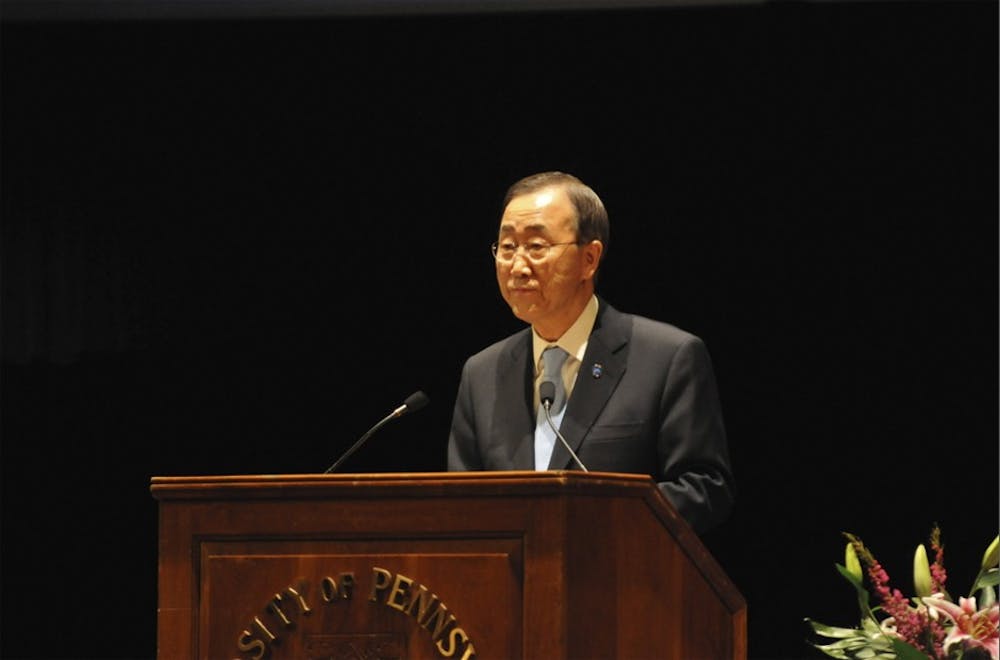
United Nations Secretary-General Ban Ki-moon addressed a packed crowd of students, administrators and community members Monday at Irvine Auditorium in the opening address of the Fifth Global Colloquium of University Presidents.
Presidents of 29 universities from 18 countries around the world listened as Ban discussed the Colloquium’s topic of “Empowering Women to Change the World: What the U.N. and Universities Can Do.”
“In too many countries and too many communities, women are still second-class citizens,” Ban said. Though the gender gap in education is closing, too many women do not complete their education or have fewer job opportunities than men, he added.
Women’s rights have been a top priority during Ban’s tenure as U.N. Secretary-General. He has increased the number of women in leadership at the U.N. by more than 40 percent in his five years and has created U.N. Women, an entity to specifically address women’s issues around the world.
U.N. Women executive director, former Chilean President and Under-Secretary-General of the United Nations Michelle Bachelet, as well as Senior Adviser to President Obama and Chairwoman of the White House Commission on Women and Girls Valerie Jarrett are scheduled to speak Tuesday as part of the two-day event.
In his speech, Ban heavily referenced the importance of the current revolutions happening in Egypt and Libya and the significance they play in elevating women’s status and freedom in the world.
In regard to the current revolutions, Ban said the political changes must respect the fundamental rights of women, receive strong backing and not be taken for granted. “Women represent half of the world’s population … and should have their fair share in making decisions,” he said.
Penn President Amy Gutmann, a founding member of the Colloquium along with presidents from New York, Yale, Columbia and Princeton universities, said the quest for women’s rights “resonates in every corner of the world.”
While Ban worked with the U.N. to establish U.N. Women in July 2010 to improve women’s social, health and political status around the world, he said there is still a “wide gulf between aspirations and reality.” He hoped that universities, including Penn, will join him in support of women’s rights.
Ban said he believes his position at the U.N. and appointment of more female leaders has and will continue to spread “political awareness” about women’s rights and change the mentality of men.
Addressing university leaders in particular, Ban said while women and men graduate in similar numbers with doctoral degrees, women comprise less than 30 percent of tenured faculty. He said it is academia’s duty to use “your power and your partnerships” to understand why this gap exists and how it can be changed. “Our job is to give young women the tools to realize what they can do and can be.”
Ban also encouraged leaders in higher education to develop better research methods when surveying nations about health and women’s issues, as there is a lack of available statistics and non-standardized definitions in many countries.
College and Wharton junior Will Le said he was excited that Penn brought “such a high profile speaker” to campus and that the issue of women’s rights was important to address because it’s “on everybody’s mind.”
While he wished Ban had brought more of a “unique perspective to the issue,” Le said he hopes the talk will “promote more dialogue” by being a “spark to get people talking.”
College freshman Marlee Stesin said Ban was a “really great speaker.” She praised Ban for bringing up “important world issues that other people might not have known about” before the speech in relation to universities’ role in global women’s rights.
“Now is your moment,” Ban said. “Seize it.”
The Daily Pennsylvanian is an independent, student-run newspaper. Please consider making a donation to support the coverage that shapes the University. Your generosity ensures a future of strong journalism at Penn.
DonatePlease note All comments are eligible for publication in The Daily Pennsylvanian.





